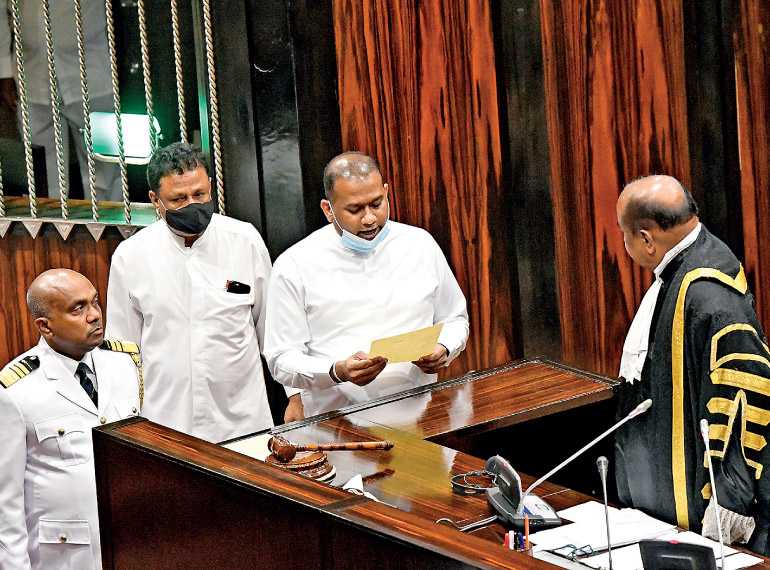Saturday Feb 21, 2026
Saturday Feb 21, 2026
Monday, 14 September 2020 01:38 - - {{hitsCtrl.values.hits}}

SLPP Ratnapura District MP-elect Premalal Jayasekera who is convicted of murder takes oaths as a MP before the Speaker on Tuesday following the Court ruling
The Appeal Court ruling permitting SLPP Ratnapura District MP-elect Premalal Jayasekera to take oaths as a Member of Parliament in its Order held that since his election has not been invalidated so far, the interim relief sought that he be permitted to attend Parliament has to be allowed, and what would subsequently take place is within the remit of the powers of the Speaker or anyone assigned by law for that purpose.
In the 11-page Order, President of the Court of Appeal Justice A.H.M.D. Nawaz, with Justice Sobhitha Rajakaruna agreeing, held that the Bench has “taken note of the important omission in the constitutional provision; namely, no person who has been elected as an MP has been prohibited from taking oaths, which seems to be the first step in a sequence of events culminating in sitting and voting in Parliament, which subsequently takes place.”
“In our view, we consider oath-taking to be a deliberate omission.
Therefore, since the election of this Member of Parliament has not been invalidated so far, the interim relief sought that he be permitted to attend Parliament has to be allowed, along with notice of this application,” the Court said.
The Court ruling came after considering a Writ Application filed by Jayasekera, who is being held at the Welikada Prison, seeking a Court directive to the Commissioner General of Prisons to permit him to attend Parliament. Acting on the instructions of the Attorney General, Jayasekera was not permitted to attend Parliament.
Jayasekera contested the Parliamentary Elections on 5 August and polled 142,037 votes in the Ratnapura District, days after he was convicted of the offence of murder by the High Court of Ratnapura and sentenced to death.
Justice Nawaz, in his Order, pointed out that Articles 89 and 91 of the Constitution does not prohibit the oath-taking of an elected Member of Parliament when his election remains valid and unimpeached.
“If at all, any declaration of invalidity can only be granted by a court of competent jurisdiction and not by a letter written by the Commissioner General of Prisons.
Even if oath-taking was sought to be prohibited, should the legislature have provided for it expressly? As is axiomatic, one cannot presume prohibitions, and prohibitions must be expressly provided for, and this is certainly another question that surfaces to the fore in this application,” the Court said.
It added: “The absence of any prohibition in the Constitution on oath-taking appears to be an intentional omission, and we would make the observation that as long as the election of the Petitioner remains valid and effectual, he cannot be prevented from attending Parliament and taking his oaths.
When we thus apply the provisions of the Constitution to the facts of this application before us, we are certainly not embarking on any interpretation of the Constitution; and in any event, if surrender of discretion and dictation are taken up as grounds of judicial review, no question of interpretation of the Constitution arises.”
The Court observed that in Halbury›s England, Parliament Volume 78 (2018), containing passages on Privileges of Parliament, its observations on ‘Claims to rights and privileges’ states that “the courts do not have jurisdiction to determine the rights of members to sit in either House of Parliament and have nothing to do with questions affecting their membership except in so far as it has been specially designated by law to act in such matters”. {Baron Mereworth v. Ministry of Justice [2011] EWHC 1589 (Ch)}.
“So, the question of sitting and voting does not arise before us and as the passage clearly indicates, it is the province of the speaker to deal with that matter or any other competent body. What is before us is a challenge to the letter P7, which prevents the Petitioner from attending Parliament, and the House has exclusive rights to make judgments concerning the conduct of Members and others in relation to Parliament,” the Court said.
Jayasekera took oaths as a MP last Tuesday following the Court ruling.